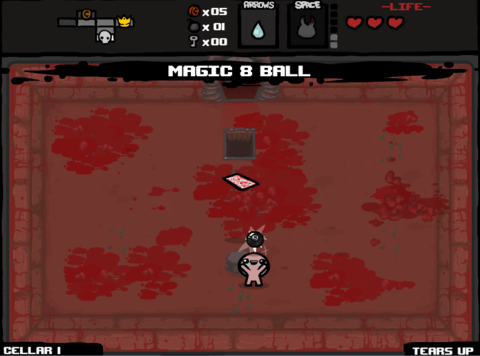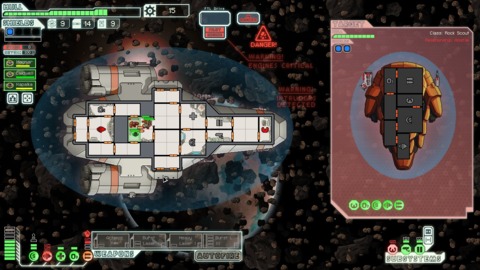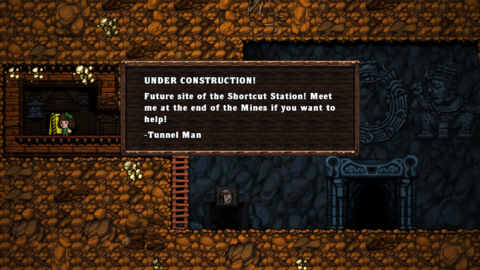I JUST BEAT FTL ON NORMAL yesterday and that (heart-pounding, jazz-handing) experience got me thinking about rogue-likes. The devaluing of the term rogue-like is in full effect. If a game has perma-death: it’s probably a rogue-like. If a game has randomly generated levels: it’s probably a rogue-like. If a game is punishingly difficult: it’s probably a rogue-like. Though these basic game design similarities imply a similar gameplay experience, the truth is that the variations within this “genre” result in wildly different experiences. One of the central differentiators in modern rogue-like design is the role of randomness. Each rogue-like incorporates some degree of randomness, but how and where that randomness is employed can be the difference between a game feeling tough, but fair, and feeling like a Sisyphus simulator. I’m going to take a look at a few of the prominent rogue-likes that have come out the last few years to point out how those games have incorporated randomness in their design, for better and for worse.

The first game I would like to look at is The Binding of Isaac, a dual-joystick shooter with all of the trappings of a rogue-like. The Binding of Isaac is full of potentially frustrating room layouts and luck-based difficulty spikes. If you go a floor without seeing any health hearts: bad luck. If you get three fart pills in a row: bad luck. However, the game itself does have an element of skill to it. Skillful dodging and shooting can be enough to progress deep into The Binding of Isaac, even without any great item drops. This skill elements helps alleviate the wild luck swings. You always feel like there was an element of personal culpability when playing since there is no randomness in how you are damaged. If you get hit, you get hurt; if you don’t want to get hurt, don’t get hit. On top of the sheer skill component, The Binding of Isaac does have some consistent upgrades built into its levels. The first floor of every game always includes at least one upgrade room. Every floor always ends with a boss that always provides a few hearts and an upgrade. Thus, the game builds some known elements that the player can rely on into its random levels. These constants help to alleviate the crushing feeling of losing a run, since the next run could immediately be promising if you get the right items on the first floor. Now elements like the slot machines, beggars, shops, and secret rooms do introduce frustration-inducing variance, but good luck is not necessary for playing a long game. Good luck is helpful, but not mandatory.

FTL: Faster than Light errs further towards randomness in its design. Other than which starting ship you pick, there is no single constant in FTL to rely on. While there is certainly skill involved in how you approach battles and events, there are very few ways to plan out what encounters you engage in or run from. Sometimes you run into a ship and are offered the option to try to avoid conflict, but your choice is not always honored since the game decides what is going to happen based on dice rolls. Furthermore, most decisions are only made with partial knowledge. For example, you could try to stop a colony from getting attacked, but you never know what ship you will be up against. As a result, FTL requires both flawless execution and star-aligning-luck to beat on any difficulty, but especially Normal and Hard. FTL constantly hides information from the player and forces the player to adjust to the shitty situations it concocts. One regularly occurring event asks a simple question: do you want to attempt to fight space spiders? If you win the dice roll, you are rewarded with free scrap and resources. If you fail, a random crew member is permanently killed. These two wildly different outcomes are the random result of the same simple choice and it is that high variance that makes FTL so frustrating. The reliance on high variance outcomes for choices that are themselves determined by random chance can lead to a feeling of powerlessness or frustration if you get too invested in one run. This randomness also leads to a brutal game that offers “this could all turn to crap at any moment” thrill and catharsis that few games can muster.

Spelunky lands firmly in the skill camp, but it also adds an element of persistent progress that eases the journey to the end game for less skilled players. Winning a game of Spelunky requires intense skill and focus, but it is entirely possible to beat the game without having a “lucky run.” Though some exploits and tricks are luck based, actually beating the game doesn’t require a forgiving item drop or a nice level layout. On top of the game being largely skill based, the game offers you the chance to build shortcut tunnels that bypass entire sections of the game. These shortcuts allow less skilled players to see the end of the game without navigating an entire game worth of precarious jumps and traps. As a result, Spelunky is less daunting or frustrating to finish than FTL or The Binding of Isaac… if finishing the game is your only goal. Spelunky also introduces a bunch of leader-boards: perfect for inspiring multiple playthroughs. Between the time based speed runs and the max money runs and the eggplant runs, Spelunky gives players a ton of avenues of play to keep the game interesting without relying on randomly generated roadblocks.
Rogue Legacy takes the constant progression found in Spelunky and adds permanent character growth to the equation. In Rogue Legacy you are able to unlock new character classes, character buffs, and skills that carry over from one run to another. Furthermore, the bosses in Rogue Legacy stay dead when you beat them. This leads to a game that can be brute-forced if necessary, since you can out level enemies and bosses over time if you are so inclined. While the game is reflex and strategy intensive, it does not require its players to truly master its systems thanks to its permanent progress. Every run in Rogue Legacy has its luck elements: your hero and caste configuration. However, even these random elements can be mitigated since you can pick between three heroes every generation and you can lock in configurations of the caste to keep the castle constant. The end result is a rogue-like that utilizes short term randomness, but on the whole is governed by attrition. Almost anyone can see the end of Rogue Legacy if given enough time. Whether that low barrier to victory is a positive or a negative is up for interpretation.
Randomness is one of the foundational concepts that rogue-likes are built upon. Too much randomness and a game can feel unfair or cheap. Not enough randomness and the game loses some of the trill and challenge that people love. Now it seems like the real question here is whether high levels of randomness are a bug or a feature. Is it poor design that it took me around a hundred runs to beat FTL on normal or is that toughness essential? Alternatively, is it good design that I was able to beat Rogue Legacy pretty quickly just by leveling or is that a devolution? Most rogue-likes present a pretty stark rejection of the player-control based game design philosophies that seem to be dominating the industry right now, but then maybe that’s the point. I personally hate feeling out of control in a game. I feel cheated when I lose due to something completely out of my control, but then again learning to accept that things can be out of my control is certainly worthwhile. Ultimately, the thrill of beating a game that seems actively malicious is a rush that few games outside of rogue-likes can offer (I BEAT FTL ON NORMAL!), and that is why I continue to play them.
Log in to comment